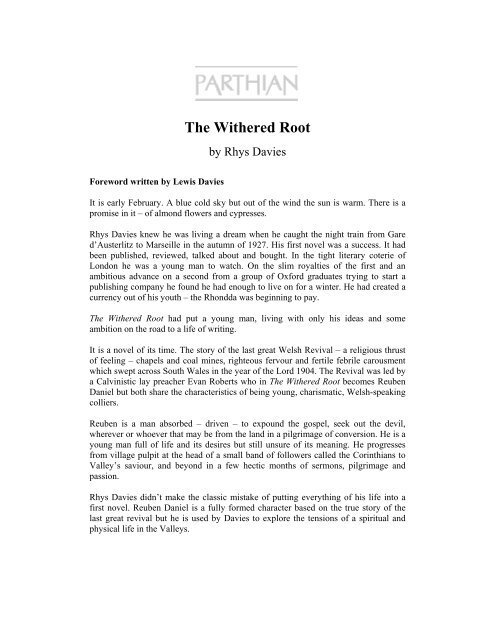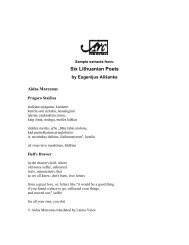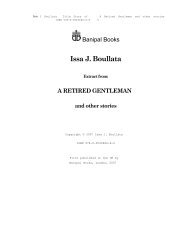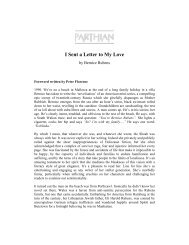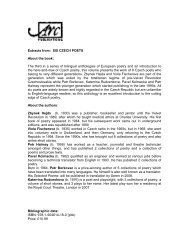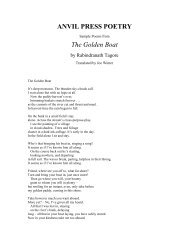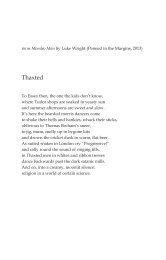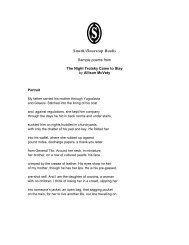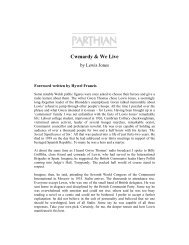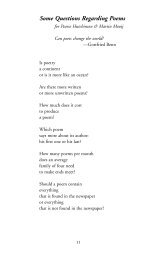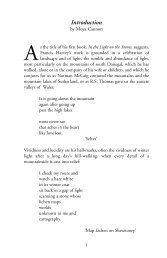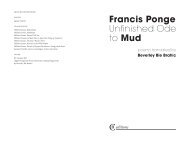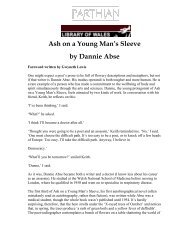Parthian - The Withered Root by Rhys Davies.pdf - Inpress Books
Parthian - The Withered Root by Rhys Davies.pdf - Inpress Books
Parthian - The Withered Root by Rhys Davies.pdf - Inpress Books
You also want an ePaper? Increase the reach of your titles
YUMPU automatically turns print PDFs into web optimized ePapers that Google loves.
<strong>The</strong> <strong>Withered</strong> <strong>Root</strong><br />
<strong>by</strong> <strong>Rhys</strong> <strong>Davies</strong><br />
Foreword written <strong>by</strong> Lewis <strong>Davies</strong><br />
It is early February. A blue cold sky but out of the wind the sun is warm. <strong>The</strong>re is a<br />
promise in it – of almond flowers and cypresses.<br />
<strong>Rhys</strong> <strong>Davies</strong> knew he was living a dream when he caught the night train from Gare<br />
d’Austerlitz to Marseille in the autumn of 1927. His first novel was a success. It had<br />
been published, reviewed, talked about and bought. In the tight literary coterie of<br />
London he was a young man to watch. On the slim royalties of the first and an<br />
ambitious advance on a second from a group of Oxford graduates trying to start a<br />
publishing company he found he had enough to live on for a winter. He had created a<br />
currency out of his youth – the Rhondda was beginning to pay.<br />
<strong>The</strong> <strong>Withered</strong> <strong>Root</strong> had put a young man, living with only his ideas and some<br />
ambition on the road to a life of writing.<br />
It is a novel of its time. <strong>The</strong> story of the last great Welsh Revival – a religious thrust<br />
of feeling – chapels and coal mines, righteous fervour and fertile febrile carousment<br />
which swept across South Wales in the year of the Lord 1904. <strong>The</strong> Revival was led <strong>by</strong><br />
a Calvinistic lay preacher Evan Roberts who in <strong>The</strong> <strong>Withered</strong> <strong>Root</strong> becomes Reuben<br />
Daniel but both share the characteristics of being young, charismatic, Welsh-speaking<br />
colliers.<br />
Reuben is a man absorbed – driven – to expound the gospel, seek out the devil,<br />
wherever or whoever that may be from the land in a pilgrimage of conversion. He is a<br />
young man full of life and its desires but still unsure of its meaning. He progresses<br />
from village pulpit at the head of a small band of followers called the Corinthians to<br />
Valley’s saviour, and beyond in a few hectic months of sermons, pilgrimage and<br />
passion.<br />
<strong>Rhys</strong> <strong>Davies</strong> didn’t make the classic mistake of putting everything of his life into a<br />
first novel. Reuben Daniel is a fully formed character based on the true story of the<br />
last great revival but he is used <strong>by</strong> <strong>Davies</strong> to explore the tensions of a spiritual and<br />
physical life in the Valleys.
Beginning in a valleys’ town, depicted as a den of iniquity in the classic mode of<br />
Victorian moral outrage, the revival takes the lives and souls of the valley as a<br />
battleground – pubs serving miners and chapels serving miners, with strays between<br />
both heightening the tension – drink was a way out – temperance another passion. <strong>The</strong><br />
revival spread quickly reaching communities in north Wales and Liverpool but within<br />
a year the fever had passed and its architect Reuben Daniels, wrecked <strong>by</strong> the stresses,<br />
mentally and physically exhausted, withdraws from public and chapel life.<br />
By the time <strong>Rhys</strong> <strong>Davies</strong> was writing <strong>The</strong> <strong>Withered</strong> <strong>Root</strong> – in the mid 1920s – he had<br />
already escaped to a smoky London paved with stories. An escape from an education<br />
he had grown out of. <strong>The</strong> regime of school at Porth County had held little attraction<br />
for him. It was a long walk and a bus journey away. He usually arrived soaked from<br />
the rain. He simply gave up on formal education at seventeen and it too seemed easily<br />
to let go of him.<br />
<strong>Rhys</strong> was an outsider then and he knew it. An observer of life – a mystery to his<br />
father but indulged <strong>by</strong> his mother and sisters – loving this strange, reserved older<br />
brother. In his memoir Print of Hare’s Foot, <strong>Rhys</strong> <strong>Davies</strong> recalls offering to visit the<br />
corpse of a recently killed old school acquaintance who was laid out in the best front<br />
room before burial – a popular custom in a valley always looking for diversions.<br />
He was an astute chronicler of the Rhondda that he had left and would periodically<br />
return to in the hard years of the Twenties when funds from his writing ran from a<br />
trickle to a drought.<br />
It was a world he would return to in his fiction all his life, with over forty books<br />
published including essays, novels and short stories. He did use London and the south<br />
of France as settings for his fiction but it was the Rhondda which continued to<br />
fascinate him and which became the setting for much of his best work. It was a place<br />
he had only really lived in as a boy and young man and he knew it could be a<br />
restrictive place to someone who was at heart an outsider. He knew he could get sent<br />
to prison for being part of what he was. To be a gay man in 1920s Rhondda was not<br />
easy but London offered an escape. <strong>Rhys</strong> was fortunate enough to make a way out,<br />
becoming part of the Welsh diaspora in London in the first decades of the twentieth<br />
century. He supported himself with a string of odd menial jobs, while observing and<br />
writing, and he found early success with a string of short stories in small magazines.<br />
He was fortunate to meet the Soho bookseller and publisher Charles Lahr who<br />
encouraged his work and even helped him to type the manuscript of <strong>The</strong> <strong>Withered</strong><br />
<strong>Root</strong>.
<strong>Rhys</strong> <strong>Davies</strong> was strongly influenced <strong>by</strong> the major writer of his time – D.H.Lawrence<br />
– with whom he shared a mining background. <strong>The</strong>y also both had mothers who had<br />
been teachers and who had harboured intellectual aspirations for their sons. Lawrence<br />
seeps into <strong>The</strong> <strong>Withered</strong> <strong>Root</strong> in the form of the hero, the descriptions of striving for a<br />
life in the blood and the search for something beyond the industrial capitalist society<br />
enveloping them.<br />
Although searching for a fusion of the spiritual and the physical – the sex is missing<br />
from <strong>The</strong> <strong>Withered</strong> <strong>Root</strong> – <strong>Rhys</strong> shies away from any physical descriptions, content to<br />
talk on the margins of frustration which were perhaps his experience of being a young<br />
man in the Rhondda. Sex of the mind.<br />
But London gave him more freedom and <strong>by</strong> the time he had enough money to embark<br />
on the second step of escape into the warm winter of the Cote d’Azur – the cambio<br />
was good to English pounds – he is already anticipating further freedoms which he<br />
chronicled in his playful memoir Print of a Hare’s Foot. A freedom of catching crabs<br />
in the brothels of Marseille and living with a new manuscript and new lovers.<br />
It was at Nice that a letter arrived from D. H. Lawrence, who was also wintering on<br />
the Cote d’Azur. Lawrence had read <strong>The</strong> <strong>Withered</strong> <strong>Root</strong> and enjoyed it. He saw the<br />
disciple in <strong>Rhys</strong> and always wanting guests to help smooth the passage of his<br />
marriage he invited <strong>Rhys</strong> to stay with him. ‘Would you care to come here and be my<br />
guest at this small and inexpensive hotel for a few days Bandol is on the Marseille<br />
side of Toulon. My wife and I would both be pleased if you come.’ <strong>Rhys</strong> caught the<br />
train.<br />
It is raining heavily now. A news stand offers La Provence across a street running<br />
with water. I listen to music in a bar of words and smoke while watching the street<br />
above the Vieux port. A couple of men talk across a table, eyes flirting with each<br />
other, blowing smoke and words into the air. Bandol is only a short train journey<br />
east. Nice a bit further on.<br />
Lewis <strong>Davies</strong><br />
"<strong>Rhys</strong> <strong>Davies</strong>'s characters all walk straight out of the page and hold one with an<br />
almost physical attraction."<br />
— <strong>The</strong> Times


